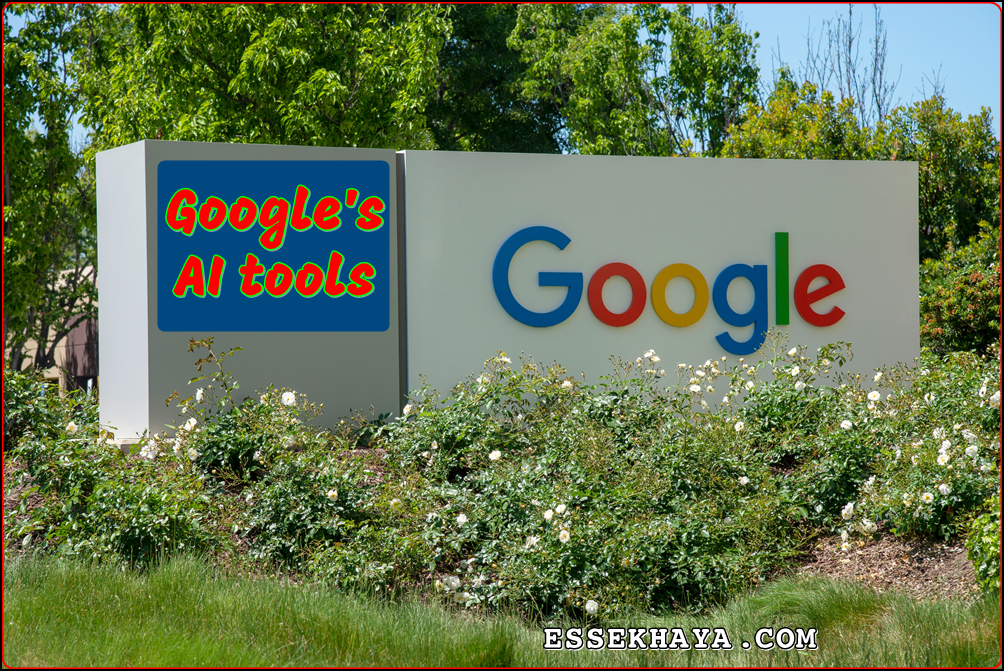Google's Exciting AI Tools: Unleashing the Power of Generative Technology
Introduction:
In the ever-changing environment of artificial intelligence (AI), Google has emerged as a pioneering force, continually inventing and delivering cutting-edge technologies to improve user experiences across its huge ecosystem. This essay digs into Google's diverse AI tools, analyzing their functions, uses, and revolutionary impact on various industries and user interactions.
 |
| Google's AI tools are transforming creativity and productivity |
Google's generative tools:
Google's AI products are led by its generative tools, which use machine learning to build novel solutions. One notable tool in this category is Google's Bard, an experimental generative AI function that has received a lot of attention. Bard is intended to help users with a variety of creative tasks, including writing, collaboration, and content creation. Its features include encouragement for creative writing, discovering new sources of inspiration, and even facilitating cooperation within the Google Workspace.
Unleashing the Power of AI: Insights from Top Experts
AI and Productivity Tools:
Google has smoothly integrated AI into its array of productivity products, including Google Docs, Sheets, and Gmail. These machine learning-powered applications let users write and collaborate more efficiently. For example, the introduction of features like prompt loop in Google Docs helps to generate innovative content by providing prompts and suggestions. Sheets uses AI to analyze data and deliver useful insights, hence improving business decision-making processes.
Collaborative creativity in the workplace:
Google's Workspace, a complete cloud-based collaboration tool, uses AI to enhance the user experience. Duet in Chrome Workspace provides a useful environment for existing documents, assisting users with their daily duties. Furthermore, the collaboration paradigm in Workspace, powered by generative AI, enables real-time engagement and creativity among team members, resulting in increased productivity.
AI for retail and enterprise:
Google's AI technologies go beyond creative applications and cover the needs of merchants and enterprise clients. Gemini, a solution for merchants, uses AI to optimize shopping processes and rewrite product descriptions. For enterprise users, the Vertex AI platform provides advanced machine learning capabilities for a variety of applications, such as data analysis and model building, which improve decision-making processes.
SEO Secrets: Boosting AdSense Earnings in 2024
Open-Source, Developer-Friendly Approach:
Google has also made efforts in making its AI tools available to developers and the general public. The AI platform includes a number of open-source tools, such as TensorFlow and Keras, that developers may use to create and deploy machine learning models. This dedication to an open ecosystem encourages innovation and collaboration in the AI community.
Google is at the forefront, constantly pushing the boundaries and redefining what's possible. Among its astonishing array of inventions, AI tools have emerged as a driving force, transforming how we work, create, and interact. In this essay, we'll look at Google's AI tools, including their influence, capabilities, and exciting possibilities.
Google’s AI Ecosystem
1. Google Cloud empowers enterprises.
Google Cloud is more than simply a cloud computing platform; it is an ecosystem that provides businesses with cutting-edge capabilities. From machine learning to data analysis, Google Cloud provides a solid foundation for businesses to use the power of AI. Businesses can gain fresh insights and make more informed decisions by utilizing Google Sheets predictive analytics or TensorFlow to develop bespoke models.
2. Google Workspace improves collaboration.
Google Workspace (formerly known as G Suite) redefines collaboration. This package includes AI-enhanced Google Docs, Sheets, and Slides. Imagine creating an essay and having the AI recommend pertinent topics or even produce summaries as you type. Google's Bard, a generative tool, helps writers by suggesting innovative ideas and increasing productivity. AI-powered real-time suggestions make collaborative writing more effortless.
How to Make Money with AdSense and Copilot in 2024
3. Google Search: Beyond Keywords.
Google Search has progressed beyond basic keyword matching. Its AI algorithms can now understand context, intent, and natural language. Whether you're researching, fact-checking, or trying out new ideas, Google Search's AI-powered results deliver accurate and relevant information. It's like having a knowledgeable research assistant at your disposal.
4. Gmail Labs: Smarter Email Management
Gmail Labs studies with AI to improve email efficiency. Smart Compose recommends whole sentences as you type, saving time and decreasing errors. Furthermore, Smart Reply provides context-aware responses, improving email conversation efficiency. Google's dedication to simplifying communication extends to Chat, where AI-powered suggestions improve conversations.
5. Gemini: The Multitask Marvel.
Gemini, developed by Google DeepMind, represents a game changer. It outperforms human specialists at Massive Multitask Language Understanding. Gemini's skills include text and coding chores, making it a useful tool for publishers, journalists, and developers. Its ability to produce creative content while comprehending context distinguishes it.
6. Duet, Chrome's AI Assistant
Duet, an AI-powered assistant in Google Chrome, improves browsing. It predicts your future steps, makes personalized recommendations, and even helps with language translation. Consider seamless browsing, in which AI adjusts to your choices, making the web experience more intuitive.
Copilot: The Best Friend of AdSense Bloggers
7. Google’s Quantum Leap
Beyond classical computing, Google's Quantum AI team is a pioneer in quantum computing. Their new quantum error correction milestone represents progress toward large-scale, mistake-resistant quantum computers. Consider solving complex issues faster thanks to quantum advances in processing capability.
Conclusion:
To summarize, Google's AI tools, which are powered by generative technology and machine learning, have ushered in a new era of possibilities across multiple areas. Google's commitment to innovation is shown in everything from creative activities and efficiency advancements to retail operations and workplace solutions. As the tech titan continues to reveal intriguing AI capabilities and tools, the landscape of AI applications will definitely evolve, influencing the future of technology and human interactions.
Google's dedication to responsible AI means that these technologies help everyone. From creative writing to enterprise solutions, AI enhances human abilities. As we embrace this exciting era of AI, keep in mind that Google's tools are more than just technology; they are about empowering people to do more, one algorithm at a time.
Comments
Post a Comment